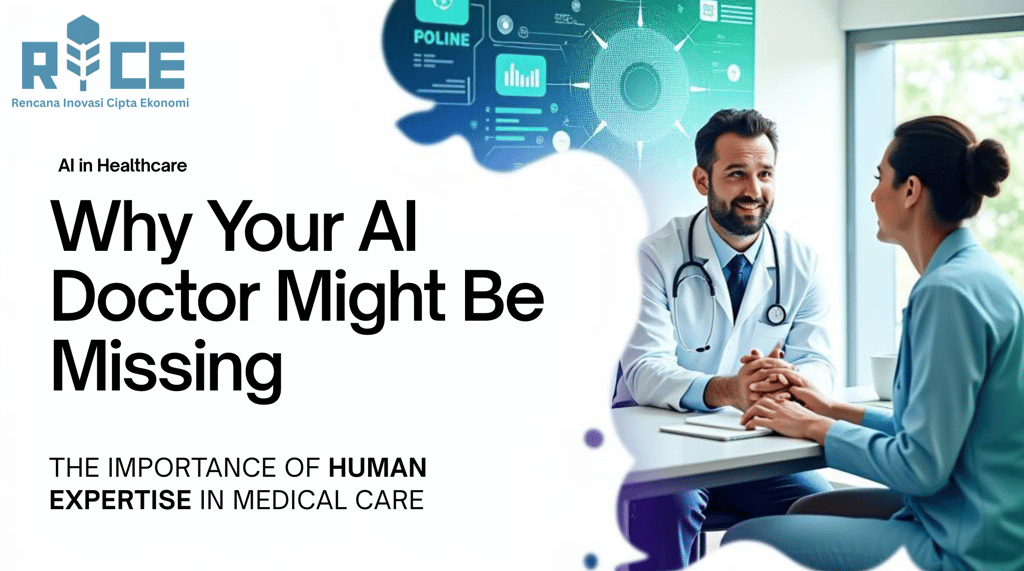Why Your AI Doctor Might Be Missing the Obvious (And When Humans Win)
Discover why human empathy and critical thinking remain vital, and how a human-AI partnership creates better patient outcomes.
INDUSTRIES
Rice AI (Ratna)
10/1/20257 min read


The advent of Artificial Intelligence in healthcare promises a revolutionary future: faster diagnoses, personalized treatments, and unprecedented efficiency. We imagine an era where advanced algorithms sift through vast datasets, identifying patterns invisible to the human eye, predicting disease trajectories, and even recommending optimal therapies. This vision paints a powerful picture of a healthcare system optimized by digital intelligence, reducing human error and democratizing access to expert medical insights.
Yet, amid this undeniable excitement, a critical question emerges for industry experts and professionals: Are we overlooking inherent limitations in our rush towards AI integration? While AI excels at specific tasks, its perceived infallibility can mask profound blind spots, particularly in the nuanced, complex, and deeply human realm of patient care. It's time to critically assess where AI genuinely shines and, more importantly, where the irreplaceable strengths of human clinicians continue to hold sway.
The Promise and Peril of Algorithmic Diagnostics
Artificial intelligence has demonstrated remarkable capabilities in medical diagnostics, particularly in areas like radiology and pathology. Its ability to process and analyze immense volumes of data at speeds impossible for humans is genuinely transformative. However, this power comes with inherent perils that demand our careful attention.
Data Dependency and Bias Amplification
AI systems are fundamentally dependent on the data they are trained on. This principle, "garbage in, garbage out," is acutely relevant in healthcare. If the training data is incomplete, unrepresentative, or contains historical biases, the AI will not only replicate but often amplify these flaws in its diagnostic outputs. For instance, if an AI is primarily trained on data from a specific demographic group, its diagnostic accuracy for underrepresented populations may be significantly compromised, leading to misdiagnoses or delayed care.
Such algorithmic bias isn't merely a technical glitch; it can embed and perpetuate systemic inequalities within the healthcare system. An AI designed to predict disease risk might inadvertently assign higher risk scores based on socioeconomic factors or race, rather than purely clinical indicators, if those biases are present in its training data. Understanding and mitigating these biases is a monumental task, requiring meticulous data curation and continuous ethical oversight to ensure equitable diagnostic outcomes. At Rice AI, we recognize these challenges, prioritizing diverse and meticulously vetted datasets in our development processes to minimize inherent biases and promote equitable health outcomes across all demographics.
The Black Box Problem: Lack of Explainability
Many advanced AI models, particularly deep learning networks, operate as "black boxes." This means that while they can produce highly accurate predictions or classifications, the intricate reasoning process behind their conclusions remains opaque. A physician might receive an AI-generated diagnosis or treatment recommendation but have no clear understanding of why the AI arrived at that specific output. This lack of transparency presents a significant hurdle in a field where trust, accountability, and the ability to justify clinical decisions are paramount.
For healthcare professionals, the inability to explain an AI's reasoning can erode confidence in the system and complicate patient communication. How can a doctor confidently explain a diagnosis or treatment plan to a patient if they cannot articulate the underlying logic from the AI? Furthermore, in cases of medical error or legal challenge, the black box nature of AI makes it exceedingly difficult to pinpoint accountability. The call for "Explainable AI" (XAI) in medicine is growing louder, seeking to bridge this gap by developing AI systems that can provide human-understandable justifications for their decisions, thereby fostering greater trust and facilitating clinical adoption.
Beyond the Data: The Unquantifiable Human Element
While AI excels at pattern recognition and data processing, healthcare is not merely a collection of data points. It is a deeply human endeavor, replete with emotions, subjective experiences, and a labyrinth of social and psychological factors that defy algorithmic quantification. This is where the human clinician's strengths become not just valuable, but indispensable.
Empathy, Context, and Nuance in Patient Care
A patient's narrative extends far beyond their electronic health record. A human doctor observes non-verbal cues – the subtle tremor in a hand, the slight hesitation in a voice, the unspoken anxieties reflected in a patient's eyes. These nuances, often vital for accurate diagnosis and compassionate care, are largely invisible to even the most sophisticated AI. Empathy allows a clinician to understand the emotional impact of an illness, to tailor communication, and to build the trust essential for therapeutic relationships.
Contextual understanding is another critical human advantage. A symptom might mean one thing in a young, otherwise healthy individual and something entirely different in an elderly patient with multiple comorbidities and complex social circumstances. AI struggles to grasp these broader psychosocial determinants of health, such as financial stress, family dynamics, or cultural beliefs, which profoundly influence a patient's health and their ability to adhere to treatment. A human doctor integrates this rich tapestry of information, providing patient-centered care that addresses the whole person, not just their disease. At Rice AI, we’re focused on augmenting human empathy, developing AI tools that provide comprehensive patient profiles and identify potential psychosocial barriers, empowering clinicians to deliver truly holistic care.
Handling the Unprecedented and the Ambiguous
AI systems learn from existing data and excel at identifying patterns they have previously encountered. Their performance can degrade significantly when faced with truly novel situations – a completely new pathogen, an exceedingly rare disease presentation, or an unexpected drug interaction that has no precedent in their training data. In such scenarios, AI might either fail to identify the problem or generate an incorrect, "confidently wrong" diagnosis.
Human clinicians, by contrast, possess the capacity for critical thinking, adaptive reasoning, and intuitive judgment. They can synthesize disparate pieces of information, formulate hypotheses in the absence of complete data, and draw upon a vast reservoir of general medical knowledge and lived experience to navigate ambiguity. When confronted with the unprecedented, a human doctor can consult, research, innovate, and improvise – qualities that remain beyond the current capabilities of even the most advanced AI. This ability to reason from first principles and adapt to unforeseen challenges is a cornerstone of effective medical practice.
The Evolving Partnership: Where AI and Humans Intersect
The narrative shouldn't be about human versus AI, but rather about a powerful, synergistic partnership. Recognizing AI's inherent limitations while leveraging its strengths is key to building a more resilient, efficient, and patient-centric healthcare future. The goal is not to replace human clinicians but to empower them with advanced tools that enhance their capabilities.
AI as an Augmentation, Not a Replacement
In many areas, AI serves as an exceptional augmentation tool, freeing clinicians from laborious, repetitive tasks and providing insights that enhance diagnostic accuracy and treatment planning. AI excels at image analysis, identifying subtle abnormalities in scans (e.g., mammograms, X-rays) that might be missed by the human eye, reducing burnout, and improving detection rates. It can predict disease progression, identify patients at high risk for certain conditions, and even accelerate drug discovery by analyzing vast chemical libraries.
For administrative tasks, AI can automate scheduling, handle billing inquiries, and manage electronic health records, allowing doctors and nurses more time for direct patient interaction. When viewed as an assistant or a powerful second opinion, AI becomes an invaluable asset, not a threat. It optimizes workflows, streamlines decision-making, and helps healthcare professionals focus on the truly human aspects of their profession. Rice AI is committed to this vision, developing AI solutions that seamlessly integrate into clinical workflows, offering smart EHR analysis, preliminary screening tools, and intelligent predictive models that empower healthcare professionals to deliver superior patient care without compromising the human connection.
The Indispensable Role of Critical Thinking and Ethical Oversight
Even as AI becomes more sophisticated, the critical thinking and ethical oversight of human professionals remain indispensable. Clinicians must possess the ability to critically evaluate AI outputs, understanding that an AI recommendation is a starting point, not a definitive command. They need to validate the AI's suggestions against their own clinical judgment, patient context, and a robust understanding of medical ethics. This human layer of scrutiny is crucial for identifying potential AI errors, biases, or misinterpretations that could lead to adverse patient outcomes.
Furthermore, medical professionals play a vital role in shaping the development and deployment of AI in healthcare. Their practical insights into clinical needs, workflow challenges, and patient safety concerns are essential for guiding AI researchers and developers toward creating truly beneficial and responsible tools. Establishing clear ethical guidelines, regulatory frameworks, and accountability mechanisms for AI in medicine requires continuous collaboration between technologists, clinicians, ethicists, and policymakers. This ensures that AI serves humanity's best interests, always prioritizing patient well-being and upholding the highest standards of medical practice.
Charting the Future: A Human-AI Symbiosis in Healthcare
The journey towards integrating Artificial Intelligence into healthcare is complex, exciting, and fraught with both promise and inherent challenges. While AI offers unparalleled analytical power, its limitations in understanding human nuance, empathy, and unprecedented situations are stark. These are precisely the domains where human doctors, with their critical thinking, emotional intelligence, and adaptive judgment, not only prevail but are absolutely essential. The future of medicine is not one where AI replaces the human doctor, but rather one where a profound symbiosis emerges.
Imagine a healthcare system where AI handles the data-intensive, repetitive, and pattern-recognition tasks, providing clinicians with highly curated insights and predictive analytics. This frees up human doctors to focus on what they do best: applying nuanced judgment, building therapeutic relationships, providing emotional support, and navigating the complex, often ambiguous terrain of individual patient care. This collaborative model harnesses the best of both worlds, ensuring efficiency and accuracy while preserving the irreplaceable human touch.
For industry experts and professionals, the path forward involves embracing AI with open eyes and a critical mind. It means investing in rigorous data governance, prioritizing explainable AI, and fostering continuous education for clinicians to effectively collaborate with these powerful tools. It requires a commitment to ethical AI development, ensuring that technology enhances, rather than diminishes, human dignity and equitable access to care.
Are you ready to explore how responsible AI integration can empower your healthcare practice without losing sight of the human element? Discover how Rice AI is pioneering human-centric AI solutions that bridge the gap between technological innovation and compassionate care. Let's build a future where AI and humans work together to deliver the highest standard of health and well-being.
#AIinHealthcare #MedicalAI #HumanVsAI #HealthcareTechnology #FutureofMedicine #DiagnosticAI #EthicalAI #ExplainableAI #PatientCare #ClinicalDecisionSupport #HealthcareInnovation #DigitalHealth #ArtificialIntelligence #HealthTech #RiceAI #DailyAIIndustry
RICE AI Consultant
To be the most trusted partner in digital transformation and AI innovation, helping organizations grow sustainably and create a better future.
Connect with us
Email: consultant@riceai.net
+62 822-2154-2090 (Marketing)
© 2025. All rights reserved.


+62 851-1748-1134 (Office)
IG: @riceai.consultant
